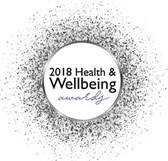Appreciate what you haveTake time to appreciate what you already have and not get too caught up in high expectations for the holidays. Enjoy what comes your way, and find abundance in each moment. Notice the simple things that you take for granted and marvel at how amazing they all are! Try some home yoga practiceA great time to commit to a short daily yoga practice, even if it is only one pose, or sitting and taking 12 steady, slow breaths. Sanctuary in a bookFind sanctuary in a contemplative book, even if only for 5 minutes a day. Be in natureSpend some time with nature. If that isn't possible, spend a few minutes each day gazing at a tree or plant. Treat yourself - mindfullyTreat yourself, but try and do it mindfully so that you really enjoy it and will remember it later on and so enjoy it again when you think of it! Be kindDo a kind action every day for no particular reason. Share some joy with others in your local community, or do something kind for yourself. Random acts of kindness, even if only a smile to someone you don't know.
Here's to wishing you a wonderful holiday season and a joyful and healthy new year. x
0 Comments
Breathing well in yoga can seem tricky As a beginner to yoga, it can seem difficult to keep the focus on the breath. It is common to find that you’ve been holding your breath and straining in some postures. Arms and legs are just about doing what the teacher has invited you to do - but your breath, well who knows? This is particularly noticeable in a fast-paced or deeply strenuous class where the body is most dominant and anything else gets left behind as you work your way through the class. So what if my breath isn't great?Day to day we typically breath 12-15 breaths per minute. The rate, depth and quality of it can help adjust our levels of anxiety and stress, our immune system effectiveness and many more physical and mental health markers. Yoga offers profound teachings in the breath if we choose to listen that can support our health, wellbeing and awareness in our day to day lives. Familiarity helps to develop our breath focusGradually, with familiarity of a regular yoga practice, we can start to remember to breathe with a flowing and calmer breath. And eventually the breath and movements start to link together more. From here we can start to take that further still and refine into a more advanced yoga practice. Once you feel you are able to link the breath and movements together, then the power of the breath can really start to be harnessed and the refinement and quality of our yoga practice can bloom. Our nervous system will feel immense benefit from working skilfully with breath centring and we can move beyond the endorphin highs of vigorous and strenuous yoga practice and move towards maturing our yoga practice. The breath powers our yoga practiceSounds obvious, of course we need to breath to power everything that we do or we’ll collapse in a heap. But it is easy to forget about the quality of our breath when distracted or physically strained. What if you eased back from the strain and found a spaciousness in the breath to develop the power of your yoga practice instead? What would that feel like? What could it do to your yoga practice? What if we found our physical alignment from our breath?We often listen to the technical instruction from the yoga teacher: move your foot here, rotate your hip there, etc... Breath-centred practice can support us to more naturally open and expand your body into a posture, rather than teaching instruction being the main driver. Explore how your breath can position you into a natural alignment from within that is unique to your body structure and your deepening breath. Starting out with breath-centred yoga practiceThe classes at Bristol YogaSpace work with a deeply breath-centred approach to yoga. Rather than simply coordinating with our breath, which is common in many Vinyasa, Flow or Ashtanga yoga practices, we centre ourselves in the breath more deeply and use it to power the practice and direct the postures and focus.
When I started out some 20 years ago I practiced Ashtanga yoga, a vigourous and strong yoga practice, then Iyengar yoga which is technical and detailed in its formal postures. But I eventually discovered a truly breath-centred approach in Viniyoga and practice was transformed for me. Perhaps ask your teacher more about the breath when you feel ready or curious or come along to a Viniyoga class which specialises in breath-centred yoga practice, or a yoga workshop to support you to develop more breath centring in your yoga practice. Enjoy your yoga practice. “Without breath, it isn’t yoga – it is like a river without water” Krishnamacharya They aren't entirely sure why, as you don't get puffed in the same way that you do doing more traditional cardiovascular exercise. But research suggests it is true and believe it is due to the combination of exercise and stress reduction.
According to the research, yoga leads to weight loss, lowers cholesterol and cuts blood pressure. And it even helps you quit smoking. The research involved 2,700 people and also found that regular yoga practice reduced blood pressure 3x more effectively then taking pills. "Yoga may provide the same benefits in risk factor reduction as traditional physical activity such as cycling or brisk walking". Says researcher Myriam Hunink of Erasmus University and Harvard University. Maureen Talbot of the British Heart Foundation said "any physical activity that can help reduce the risk of cardiovascular disease should be encouraged, and the benefits of yoga on emotional health are well established". Brilliant, get yourself to a class or start your home practice today! See our class schedule here and get in touch to find out more. Back to the Bristol YogaSpace homepage.  Life is busy and stressful but yoga can help give you peace of mind, health, strength and support. We talked about this and much more when I was recently invited as a guest on Steve Yabsley's lunchtime radio programme. So if you have 20 minutes, have a listen by pressing the play button below. (Or find the full radio show on Listen Again here >) 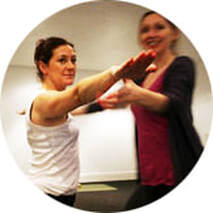 About 3 or 4 months ago a woman in her late forties joined my class who had been diagnosed with high blood pressure. She wanted to know if yoga would help and was willing to give yoga a try. She came every week, almost without fail, and enjoyed the classes. We took it gently at first, modifying postures where needed, ensuring that the practice was safe and giving her body time to get used to moving in new ways. After some practice, she took well to the ujjayi breathing, and even came to a weekend workshop to explore taking yoga further. I had a wonderful email from her this week saying she has had her high blood pressure re-tested and it is back to normal and she credits the yoga practice for this. However let's give the credit right back to her. She was motivated to do something positive to help herself with her health situation. She was ready to make changes to her lifestyle that were contributing factors to her high blood pressure (high stress and lack of exercise). She stuck with it, even though at first she saw no tangible improvement in her blood-pressure and asked how long it would take for the yoga to 'work'. She helped her health situation for herself and she now has her own reward. All of us have this ability within us to help ourselves and I'm inspired by students who come and practice the yoga teachings in their own way for their own aims. It does take perseverance; it isn't overnight. Often when we arrive at a class we are looking to improve imbalances or issues that have crept up over years or decades, and these won't be changed in a few sessions. But hopefully by finding a yoga practice that you enjoy you will enable the improvements to come. Another woman in her early thirties came to my class in December. She was a British Athlete, a snowboarder, who had suffered a serious concussion and was unable to continue her rigorous slope and gym training. With frequent, regular yoga practice, she was able to continue her physical training in a way that adapted itself to her injury. She found a sense of peace of mind and confidence. Then in February she went on to win Britain's first Olympic medal on snow. Well done Jenny Jones! Yoga is adaptable to any injury, illness or health situation. When skillfully applied, it can be a great support and help you pave your way to improvements. The tools are varied and some may be more appropriate than others - bodywork, breathwork, meditation. No matter what your situation there will be something you can do to get started. Please get in touch to find out more or read more about yoga therapy here. Back to YogaSpace homepage  Mindfulness - to be mindful. To be aware of each moment and to act with intention. Christmas - beyond the religious festival it is to fill stockings, make plans, see friends and family, plan menus, arrange travel, eat wonderful rich foods etc. It's busy, fun, tiring, stressful, overindulgent, exciting, a whirlwind ... a mix of many things. For many people, trying to maintain a sense of mindfulness when life gets hectic is a challenge most of us struggle with. Those who go to a yoga class will already have a headstart in maintaining a mindful attitude. To practice yoga is to develop a mindful body and movement with mindful breath. Maintaining a mindful approach helps you to enjoy the whirlwind. To experience joy and gratitude for the festivities all around us. It is all too easy miss if your too busy to notice. Try this... To help you remain mindful try setting aside as little as 5 minutes each day to re-set your intentions. Sit quietly, perhaps alone, or over a quiet cup of tea. Do nothing else except gaze softly at a blank wall, table, or natural object and settle your gaze there gently, or close your eyes. Notice your breathing, and connect with yourself for a short while. Note your intentions for the day and resolve to pursue them. Try this for 5 minutes each day through the Christmas period. Try not to get carried away in the potential whirlwind but to stay connected to what is important to you and to enjoy the moments. If you find yourself feeling too rushed or stressed, take a few deep breaths and ask yourself 'what would my 'mindful self' do?', and then act. Remember to take time to enjoy your Christmas festivities. Keep up some yoga or other grounding practice if you can. And see you in class in the new year. Back to Bristol YogaSpace homepage 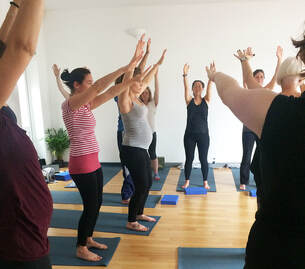 Each week in my yoga classes in Bristol, I see people come in to class feeling tired, perhaps agitated by their day, and usually more than a little lack lustre. When they leave, there is a noticeable difference in how they seem. They are usually settled, calmer, and more comfortable in themselves. A better version of themselves. They have changed. During the class we move the body, opening, expanding, stretching, challenging, engaging and working the entire body in some way. We breathe fully, slowing and extending the breath where possible. And we try to focus internally and our breath. I came across a fascinating talk by Amy Cuddy recently called 'Your body language shapes who you are'. Amy is a social psychologist. She researches body language at Harvard Business School and she was interested in researching how body language not only effects other people's perceptions of us, but how it actually effects our own body chemistry. In her research she concluded that by standing up tall with the feet apart and with the arms raised and open for only 2 minutes daily, we can raise our testosterone levels (dominance hormone giving a confident outlook), and reduce cortisol levels (stress hormones). Simply by changing our body position in this way, we are altering our hormones and brain chemistry. We are changing ourselves to not only feel but become more powerful, confident and laid back. Great! In yoga classes it is very likely that you'll do a lot of arm raising like she describes, standing with the feet apart, reaching up, opening up. Also combining this with bending forwards, twisting and so on. So her research suggests that we are actually changing ourselves and our hormones in a very real way by doing this. I took two things from Amy Cuddy's inspiring talk - firstly, that yoga postures seem very aligned to the body changes she talks about, and that by doing them you'll actually become more confident and laid back. - and secondly, that only a little practice, taken regularly, can make a big difference! Pass it on... PS. I love TED Talks! Back to Bristol YogaSpace homepage  Yep, Halls menthol sweets are being marketed as a way to stay cool and calm all through the summer, not just when you have a cold. Breathing deeply, especially exhaling deeply are great at settling and calming yourself (just take a deep breath and see) and integral to yoga practice. So interesting to see sweet manufacturers are catching on. Although not supporting taking sugar throughout the day to stay calm using breathing in this way is great! Back to Bristol YogaSpace homepage I'm biased I know, but I think most people could benefit from yoga practice! I work with a lot of mums, especially in my private yoga therapy work, where women come to me without much time or space for themselves, and have a range of physical, mental and emotional issues such as stiffness, aches on one side from carrying children on one hip, stress through the shoulders, poor sleep, over-eating, worrying, and an over-active mind that refuses to slow down at the end of the day.
These are common complaints but particularly so for mums whose days aren't their own anymore and who struggle to find time to take care of themselves. Yoga doesn't have to be a weekly class, although this is often the best way to ensure you actually make it on to your mat at least once a week and spend a good hour doing a full yoga practice. Yoga can also be fitted in to your busy schedule, requiring perhaps as little as 15-20 minutes a day to help keep you physically, mentally and emotionally supported. Think of how you might tend to a garden - keeping it tended to little and often is as good, if not better, than a big session every now and again to keep it all under control. A practice that is customised for you is ideal, incorporating some physical postures to help energise the body, stretch and release tension, strengthen the posture to help alleviate aches and pains. Plus perhaps some breathing work to settle the mind and restore balance, and perhaps even meditation if interested (which has well known stress-relieving and healthful attributes). All of these practices will help you create and maintain some well-earned space for yourself, and can be fitted in to those small pockets of time once the kids have gone to bed, when they are napping, when they are watching tv, or before you go to bed. In my group classes I always encourage students to try some yoga practice at home if they are interested. Part-way through the term, I'll often offer them a small handout with a short practice to try for themselves at home. Sometimes students keep it up and come back weeks or months later reporting how much more benefit they get from yoga once they have started regular practice at home. Of course a daily healthful practice doesn't just have to be yoga, there are other things that you might find you enjoy that keep you motivated to continue with it. But what better way to nurture your health and wellbeing than by giving yourself the gift of a short yoga practice a few times a week to help maintain balance and health in your life. We do it all day long, and most of the time we don't even think about it. Maybe we notice our breathing if we are climbing a flight of stairs and we breathe more heavily. Or perhaps if we are upset and our breathing becomes affected we become aware of it. But mostly it just carries on unconsciously.
In yoga we become trained to listen, feel and even count our breath. We see it as a mirror reflecting how we are and learn to observe it and even control it sometimes, for beneficial effects. A smooth, flowing, regulated breath helps to stabilise our thoughts and our minds. Steady full breathing encourages relaxation to set in and helps release deeply held tension that we aren't even conscious we are carrying. Students often first come to yoga without having consciously listened to their own breathing before. This alone can be challenging for some but eventually it is deeply rewarding. We almost need to 'learn' how to breathe properly. This sounds silly as we manage quite successfully to breathe all day long. But often we don't breathe very effectively or efficiently and there is usually room for improvement. There are even projects dedicated just to improve our breathing, like The Breathing Projectin NYC. Ultimately better breathing can promote better health. The shallow every-day breathing that we often use can be encouraged to be deeper. Try this for a moment Try taking a full, deep, slow inhale. Keep inhaling until the belly expands, notice the chest rise up gently. Then slowly exhale and feel the body gradually soften as you do so. Breathe out until there is no breath remaining in the lungs. Try using the tummy at the end, pulling it in to squeeze any last air out of the body. Notice how much longer that breath took than usual, and then perhaps realise how much more fully you could breathe if you paid attention to it. Allow the shoulders to relax and take another full breath. The benefits of breathing properly are broad and wide ranging. To name a few, they include reduced anxiety, stress and even blood-pressure. Relaxed respiratory muscles and some neck muscles. More efficient breathing and oxygen exchange and improved cardiovascular system. Strengthened diaphragm and intercostal (rib) muscles. Better posture. Improved physical endurance. And of course, a calmer state of mind. Yoga dedicates a whole aspect of its teaching to Pranayama or breath control and many techniques take years to master. The breath is more powerful than we realise. Try noticing it at a few different points today and see if it tells you anything about youself. It almost certainly will if you take the time to listen. Back to homepage This question is one that I get asked regularly. The responses are different for different people and of course, there isn't a right or wrong answer, yoga is different things to different people...
Yoga for fitness? People take to physical activity for the challenges that are supposed to help keep us supple and healthy. Yoga can provide a range of challenges, some intense and others more relaxing depending on the yoga practice. The movements can help you feel better in yourself (as long as you work within your own limits and progress sensibly), can strengthen you and keep you suitably supple. However here is definitely more to it than a regular fitness regime, otherwise why not go to the gym? Yoga for stiffness? Yoga is notorious for its bendiness and many people believe they need to be bendy to do yoga. Not so! The bendy poses are not in the majority, and many postures are completely accesible for stiff people too and over time the stiffness will ease up so yes, great to help improve stiffness. Yoga for posture improvement? Yoga is perfect for strengthening and improving posture. After all, the physical postures or asana were originally designed to keep the body strong and stable to enable hours of meditation by the yogi. So the benefits of practising yoga asana can support our modern day posture needs too. Yoga for relaxation? Stretching and limbering up the body can help encourage the body to let go of tension. Along side this, focusing our minds on body and breath work can help relax our minds from the tensions of daily grind. Yoga can help us ease up on tension and encourage the body, and the breath, and even the mind, to relax. Yoga for stress-relief? It is well known that the work in yoga leaves people feeling calm and with a pervasive sense of well-being. Some people report this also from running, swimming, eating chocolate... Yoga definitely helps both release stress, and also to have the ability to recognise it earlier. By taking the time to listen to our bodies and minds, and recognising the signs of stress early, and by understanding what the causes are, we can begin a deeper pattern of change to prevent stress-related problems. Yoga for healing? Yoga is known for its therapeutic help, and I work with a lot of private yoga students who will testify to this. For a variety of reasons, they find a regular yoga practice helps improve their bodies and also helps them with much more besides. Movement and good breathing can help heal the body and mind and encourage repair, renewal and strength. Yoga can be as gentle or as strong as is needed to ensure it is beneficial to whoever is practicing it. I work with people recovering from sometimes serious illness who physically are very limited. But there is always something you can do that will gradually lead to greater ability and hopefully progress you back to health either physically, mentally or more often than not, both! Yoga for spirituality? Yoga has the ability to calm down and settle an overactive body and mind. We can stop worrying, still the incessant chit chat of the mind and move towards creating a refreshing calm, a reprieve to help us handle every day life. This in turn can lend itself to meditation and contemplation of what spirituality might mean to us. By accessing a still and settled mind we can experience the world from a different perspective and perhaps notice things we hadn't noticed before, bringing us closer to who we really are. Yoga to support personal change The philosophy and psychology of yoga has many teachings on how we perpetuate our habits, good and bad. It teaches how we can reflect on them, what their triggers and patterns are, how to know ourselves well enough that we can ultimately move towards changing them and ourselves. Yoga practice is a starting point for personal change and development. As I told a private student today, one of the joys of yoga is that it is sooo efficient. It can do all this and more in a relatively short practice, the more you practice, more the of these benefits you can get. So why do we practice yoga? Is it so we can become a little bendier than we were before? Or perhaps there is more purpose than this? Back to homepage Last Sunday was a great opportunity to take a few hours to explore ways to improve how we handle stress in our lives. Stressful life is a given for most of us. We're busy, our lives are full, our jobs, kids, families, homes, obligations keep us pretty much flat out.
I'm used to welcoming people into my weekly yoga classes who are exhausted and stressed out. We often keep going until we are exhausted, and only really stop when things get to a point where we actually can't go on, when our bodies tell us in no uncertain terms that we must stop. We all do it, but of course it takes it's toll. Research suggests that stress is one of the biggest contributors to ill health and an early demise from various related health conditions such as heart disease. So Sunday's yoga workshop on stress relief was a chance to explore some simple, easy to practrice yoga methods that can help us manage our lifestyles and keep stress levels lower. The aim was to teach them in a way that means they can be practiced daily or regularly at home. Short, regular practice of these methods can make a dramatic difference to our ability to deal with stress and having a few techniques that you can use at any time, even at work or when in the car stuck in traffic, can help reduce our stress levels. Simple breath techniques, body work or meditation for a few minutes every day can make a huge difference. The yoga workshop on stress relief at Bristol Yoga Space explored a few easy methods and gave handouts on how to practice them at home. Another workshop on stress relief will be held in early Autumn too. Keep an eye on the website for dates. |
More blog articles >Categories
All
Archives
July 2024
|
|
Bristol YogaSpace Ltd
Princes Place, Bishopston Just off Gloucester Road Bristol BS7 8NP |
|


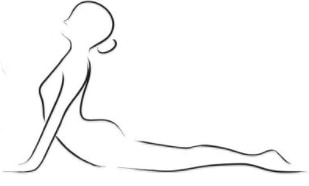
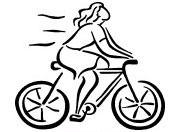
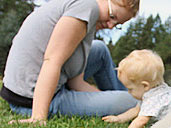

 RSS Feed
RSS Feed

